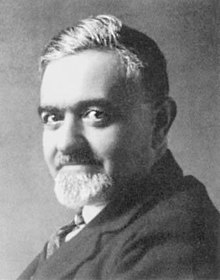Giuseppe Vitali
Giuseppe Vitali (born August 26, 1875 in Ravenna , † February 29, 1932 in Bologna ) was an Italian mathematician . He became known through the proof of the existence of sets that are not Lebesgue measurable ( Vitali sets ).
Giuseppe Vitali finished his mathematics studies at the Scuola Normale Superiore in Pisa in 1899 . For the next two years he was Ulisse Dini's assistant . Due to financial problems he then worked as a teacher in Genoa a. a. at Colombo High School . and was involved in the Socialist Party until it was dissolved by the fascists in 1922. He then applied for professorships and was appointed first in Modena , then in Padua and finally in 1930 in Bologna.
His most important achievements consist in the introduction of the concept of the absolute continuity of functions and in the area of the orthogonal systems of functions. Furthermore, Vitali was the first to prove the existence of non-Lebesgue measurable quantities. A sentence named after Vitali deals with holomorphic function sequences , see also Vitali theorem . Another theorem proved by him is Vitali's convergence theorem , which specifies the criteria when convergence in the p-th mean and convergence locally by measure are equivalent. In addition , the Vitali coverage theorem , the Vitali coverage , the Vitali-Carathéodory theorem, and the Vitali-Hahn-Saks theorem are associated with his name.
Web links
- John J. O'Connor, Edmund F. Robertson : Giuseppe Vitali. In: MacTutor History of Mathematics archive .
| personal data | |
|---|---|
| SURNAME | Vitali, Giuseppe |
| BRIEF DESCRIPTION | Italian mathematician |
| DATE OF BIRTH | August 26, 1875 |
| PLACE OF BIRTH | Ravenna |
| DATE OF DEATH | February 29, 1932 |
| Place of death | Bologna |
